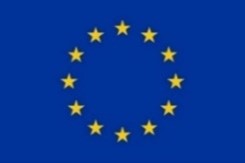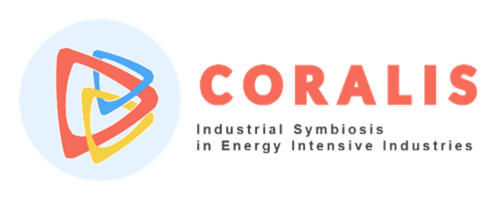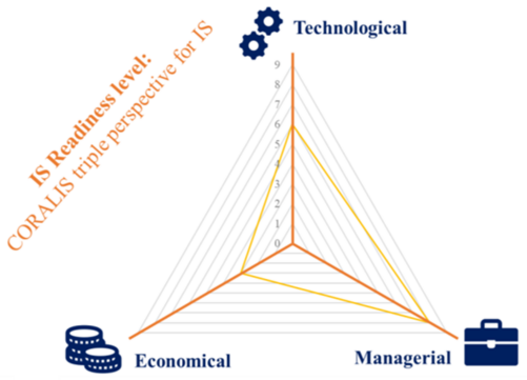Project CORALIS
Creation of new value chain relations through novel approaches facilitating long-term industrial symbiosis
In the following video, the key figures and data about the CORALIS project and its benefits for energy-intesive industries are described:
Overall approach
The EU-funded CORALIS project was a demonstration project designed for the execution of real initiatives for industrial symbiosis. Industrial Symbiosis (IS) is becoming increasingly a necessity due to its high potential for energy and resources saving. However, further knowledge in the implementation and operation of IS options is needed. CORALIS focused to set the right conditions for sustainable operation of the implemented actions to close these gaps of missing knowledge. The following factors were addressed within the scope of the project to develop an IS readiness level concept (see Figure below):
- Technological factors: Decarbonization of industrial areas, transition to circular economy
- Managerial factors: Tools and procedures
- Economic factors: Business models
The main objective of CORALIS was to create pathways for the decarbonization of resource and energy intensive sector value chains through the implementation of viable industrial symbiosis approaches. New business and management strategies were combined with innovative technology-based enablers. CORALIS delivered a harmonised framework for the monitoring of results and evaluation of their impact from a life cycle perspective, implemented into a virtual assessment platform.
Objectives
The overall approach of CORALIS was demonstrated in a total of 3 industrial parks (Escombreras, Spain – chemical, minerals, water; Höganäs, Sweden – metals, farming, energy; Brescia, Italy – steel and cast iron, aluminium). Moreover, 3 additional industrial parks followed the project results to replicate them by implementing additional IS initiatives after the project’s end. One of them was located in Linz with voestalpine and Borealis as industrial partners as well as K1-MET and Energieinstitut an der JKU as scientific partners, focusing on IS approaches based on renewable energies and hydrogen.
The project started with a deeper understanding on the preconditions that facilitate or hinder the implementation of IS (e.g. definition of enablers that will facilitate IS approaches, development of tools to support technical management of processes, improvement of management and communication mechanisms as well as new business models).
The design, development and engineering of the technology enabling the IS were followed by their commissioning and demonstration under real conditions. CORALIS supported the mobilization of local and regional stakeholders with the final aim of elaborating an action plan to guide technical implementations. Lessons learnt and an inventory of successful cases were provided, complemented by an impact calculation including a life cycle approach and a final monitoring strategy.
Framework

Project timeline:
2020-10-01 to 2025-03-31 (54 months)
Funding scheme:
H2020-LOW-CARBON-INDUSTRIES / CE-SPIRE-01-2020 Innovation Action
The project CORALIS received funding from the European Union`s Horizon 2020 framework programme - Sustainable, resource-efficient and low-carbon technologies in energy-intensive process industries (Grant agreement No. 958337).
Project consortium:
Starting with the project coordination, the consortium was composed as follows:
- Fundación CIRCE
- Azcatec Tecnología e Ingeniería SL
- Confindustria Brescia
- Energieinstitut an der Johannes Kepler Universitaet Linz
- Energy Efficiency in Industrial Processes asbl
- European Aluminium
- FERALPI SIDERURGICA SPA
- Fertiberia S.A.
- FONDERIA DI TORBOLE S.R.L
- INDUSTRIAL MINERALS ASSOCIATION EUROPE
- Incro, S.A.
- Institute of Communication and Computer Systems
- Istanbul Mineral and Metals Exporters’ Association
- K1-MET GmbH
- LAT Nitrogen Linz GmbH
- LINKOEPINGS UNIVERSITET
- O.R.I. MARTIN – ACCIAIERIA E FERRIERA DI BRESCIA SPA
- Química del Estroncio S.A
- RAFFMETAL SPA
- RINA CONSULTING – CENTRO SVILUPPO MATERIALI SPA
- RINA CONSULTING SPA
- RISE RESEARCH INSTITUTES OF SWEDEN AB
- Scuola Superiore di Studi Universitari e di Perfezionamento Sant’Anna
- Sidenor Aceros Especiales S.L
- Turkiye Petrol Rafinerileri Anonim Sirketi
- voestalpine Stahl GmbH
- WA3RM AB
- WHITE RESEARCH SRL

 DE
DE EN
EN
